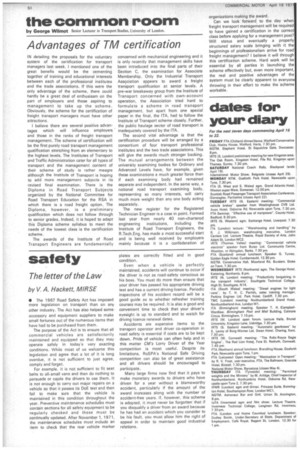the common room
Page 52

If you've noticed an error in this article please click here to report it so we can fix it.
by George Wilmot Senior Lecturer in Transport Studies, University of' London.
Advantages of TM certification
IN detailing the proposals. for the voluntary system of the certification for transport managers last week. I mentioned one of the great benefis would be the cementing together of training and educational interests between each of the professional institutes and the trade associations. If this were the only advantage of the scheme, there could hardly be a great deal of enthusiasm on the part of employers and those aspiring to management to take up the scheme. Obviously, the scheme for the certification of freight transport managers must have other attractions.
I believe there are several positive advantages which will influence employers and those in the ranks of freight transport management. The scheme of certification will be the first purely road transport management qualification stretching from an elementary to the highest levels. The Institutes of Transport and Traffic Administration cater for all types of transport and the management content of their scheme of study is rather meagre although the Institute ot Transport is hoping to add more management subjects in its revised final examination. There is the Diploma in Road Transport Subjects organized by the National Committee for Road Transport Education for the RSA in which there is a road freight option. The Diploma, however, is a preliminary qualification which does not follow through to senior grades. Indeed, it is hoped to adapt this Diploma scheme syllabus to meet the needs of the lowest class is the certification scheme.
The awards of the Institute of Road Transport Engineers are fundamentally concerned with mechanical engineering and it is only recently that management skills have been introduced into the final parts of their Section C, the examination for Associate Membership. Only the Industrial Transport Association appears to award a freight transport qualification at senior levels. A pre-war breakaway group from the Institute of Transport concerned with own-account operation, the Association tried hard to formulate a scheme in road transport management, but apart from one special paper in the final, the ITA, had to follow the Institute of Transport scheme closely. Further, the public haulage sector of road transport is inadequately covered by the ITA.
The second vital advantage is that the certification procedure will be arranged by a consortium of four transport professional institutes and the two trade associations. This will give the awards much stronger backing. The mutual arrangements between the university examining bodies for Ordinary and Advanced Levels have, for example, given these examinations a much greater force than if each examining body had remained separate and independent. In the same way, a national road transport examining body, representing so many interests, will carry much more weight than any one body acting separately.
The new register for the Registered Technician Engineer is a case in point. Formed last year from nearly 40 non-chartered engineering institutions, including the Institute of Road Transport Engineers, the R.Tech.Eng, has made a most successful start and is being well received by employers mainly because it is a confederation of organizations making the award.
Can we look forward. to the day when freight transport management will be required to have gained a certification in the correct class before applying for a management post? Will status and eventually a properly structured salary scale bringing with it the beginnings of professionalism arrive for road freight management? I believe it will through this certification scheme. Hard work will be essential by all parties in launching the scheme effectively but, even more important, the real and positive advantages of the system must be clearly apparent to everyone throwing in their effort to make the scheme workable.




























































































